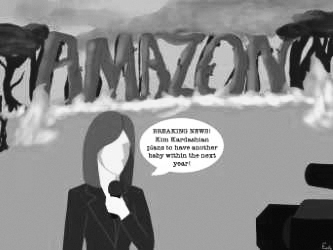We live in a time when fewer and fewer people wake up Sunday morning to rolled-up newspapers, still damp from their sprinklers and delicately folded up on their driveways. Seemingly, technology brings the entire world to our fingertips with Apple News alerts pinging our phones regularly and trivial Daily Mail stories appearing on Snapchat.
Though we are constantly connected, it seems as though the general public has become increasingly unaware of what is happening around them, or more specifically, of the non-tabloid fluff: important occurrences worldwide. Recently, a picture of a burning forest circulated the Instagram stories of members in our community. When we first saw this post, many of us thought it was another fire terrorizing our flame-prone state, but the caption that followed shocked us all: the Amazon was burning, and nobody knew.
Given that the ecosystem contributes massively to the ability for many species on earth to live by providing oxygen, acts as a habitat to many animals and is close in proximity to Brazilian cities, it was disconcerting to see that it was not receiving any media coverage. After researching further, we discovered that the Brazilian rainforest has been burning at a record rate for over three weeks, according to NASA. It would be an understatement to say we were shocked, and we believe that the rest of the world should be too. The majority of us knew more about the latest update in Miley Cyrus and Liam Hemsworth’s break-up drama than even the basic information about this ecological tragedy, revealing a sad truth about the direction journalism in the contemporary world is headed: the media prioritizes crowd-pleasing articles that maximize clicks over hard-hitting news stories.
The Amazon fire is not the only time a significant story has not received the media coverage it deserves. Last year’s Hurricane Maria proved the deadliest natural disaster on U.S. soil, according to a study published in the “New England Journal of Medicine.” During the same week, ABC canceled their highly advertised reboot of “Roseanne,” due to racist remarks from its lead actress.
The fact that this hurricane, which, according to the same study, caused around 4,600 deaths, hid in the shadows of a story about a canceled TV show proves that journalism is drifting further and further away from its core tenets.
As students journalists, our duty is to ethically report the truth and bring awareness to issues impacting global communities, not just the things we think will attract readers. Since so many media forums fight to stay alive by pleasing the public, they follow their ratings, which reveal a stronger interest in the newest addition to the Kardashians’ car collection than mass genocides or political protests.
Because of our outrage at what we consider to be unjust media coverage of such a pressing issue, our mission this year is to focus on reporting the most important stories in our local community, which we believe our readers deserve to be informed about.
We are committed to representing the voices of all of our students in each section, whether that means including more diverse perspectives in our feature articles, printing more guest editorials from members of the community or running more raw opinion stories. We will let nothing stand in the way of earning our audience’s respect by doing what we believe all journalists should: covering the topics people need to hear.




























